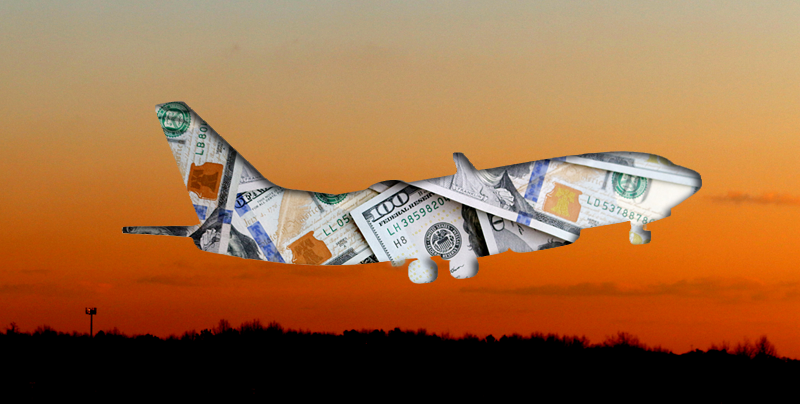For 15 years, the Passenger Facility Fee — which you automatically pay on almost every airline ticket you purchase — has been capped at $4.50; but that fee could increase by almost 89 percent to $8.50 as soon as next month if the Transportation, Housing and Urban Development and Related Agencies Appropriations Act is approved on Friday, December 8, 2017 by members of the House of Representatives of the United States.
Passenger Facility Fee to Increase By Up to 89 Percent?
Also known as S.1655, the bill contains the following language:
Sec. 119L. (a) Section 40117 of title 49, United States Code, is amended—
(1) in paragraph (b)(4), by striking “$4.00 or $4.50” and inserting “$4.00 or any whole- or half-dollar increment up to $8.50”; and
(2) in subsection (e), by adding a new paragraph (3) as follows:
“(3) The maximum passenger facility charge that may be collected from a passenger boarding a second flight on a one-way trip or on a trip in each direction of a round trip through an airport that imposes a charge may not exceed $4.50.”
The bill is sponsored by Susan M. Collins, who is a Republican member of the Senate of the United States representing and serving the citizens of the state of Maine.
More Information About the Passenger Facility Fee
Also known as the Airport Improvement Fee, the Passenger Facility Fee is charged to departing and connecting passengers at an airport; but airports are not required to charge this fee — or even collect the entire amount — from all passengers. At some airports, passengers are not required to pay the Passenger Facility Fee if they are merely connecting from one flight to another. The fee provides funding for major airport improvements; or the expansion of services provided by the airport.
Of the top 100 airports in the United States, 96 of them collect the Passenger Facility Fee, according to the Key Passenger Facility Charge Statistics report as of October 31, 2017 from the Federal Aviation Administration. Only Boise, Greenville, Memphis and Omaha do not collect the fee…
…and of the 359 airports in the United States which collect the fee, 343 of them are charging the entire $4.50.
Estimated collections based on current collection rates are $3.264 billion in 2017 and $3.367 billion in 2018.
“The health of our airport infrastructure is vital to passengers, the economy and our country’s global competitiveness. The president campaigned on this issue,” said Erik Hansen, who is the vice president of government relations for the U.S. Travel Association, which is the national non-profit organization representing all components of the travel industry in the United States. “It’s time for Congress to prioritize the interests of the broader travel industry and, as our letter shows, virtually everyone—save but a small handful of airlines—supports the Senate’s approach to airport funding.”
Not everyone agrees with Hansen. “This poll makes it clear that passengers and constituents don’t support this tax increase,” said Sharon Pinkerton, who is the senior vice president, legislative and regulatory policy for Airlines for America, which is a trade group for the commercial aviation industry in the United States. “Travelers shouldn’t have to pay more simply because airports see them as piggy banks. There is no reason to force passengers to pay more when the taxes they’ve already paid are sitting unused.”
Pinkerton is referring to the Airport and Airway Trust Fund, which currently has a balance of nearly $6 billion. According to this Internet web site — which was launched by Airlines for America so that you may voice your opinion directly to lawmakers — “Right now, you spend $63 in taxes on a typical $300 airline ticket.”
Summary
“As far as taxes go, PFCs are quite efficient and well-directed. The proceeds can only be spent in support of approved improvement projects (so not for operating expense for example), it’s a classic user-pay. Airports need to finance most of their projects and this is one way to do it. PFCs are lower than many other countries’ departure taxes anyway. The fact that they didn’t build in an ability to escalate the $4.50 cap last set in 2000 for inflation was a mistake.”
That is what Justin — who is a reader of The Gate — wrote in the Comments section of this article pertaining to this specific topic, which I wrote back on Thursday, August 3, 2017. I replied that I have no problem paying my fair share of taxes — as long as the funds are used as efficiently as possible for their intended purpose…
…but I still am skeptical that I will receive a full return on my investment in paying more taxes to fund airport and highway construction. However, that is due to my own mistrust that the federal government will properly and appropriately allocate the funds to where they are intended to go.
Besides, I do not believe that the airport experience is all that great now — even with newer airports and terminals which have already been constructed in recent years. Concourse F at the international airport which serves the greater Atlanta metropolitan area never did impress me — I visited it during its construction — and when I used it for the first time after the conclusion of an international flight upon returning from Europe earlier this year, my experience was less than stellar. I intend to document both my experience — as well as photographs of Concourse F while it was under construction — in future articles.
In the meantime, I suppose that someone has to fund the design of airports — which purportedly includes subliminal ways to part you from your money anyway…
…but I am willing to keep an open mind; so I will defer to you: would you pay a minimum of an extra $17.00 in taxes per round-trip airline ticket to fund improvement projects for airports, highways and bridges across the United States?
Photographs and composite image ©2016 by Brian Cohen.

